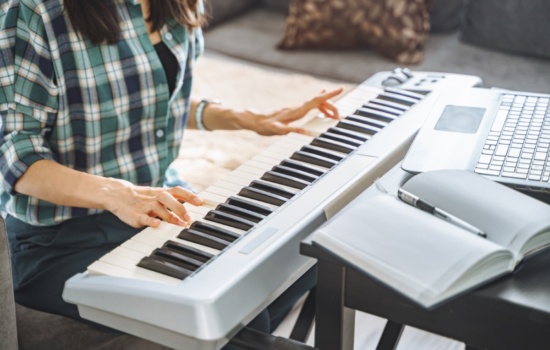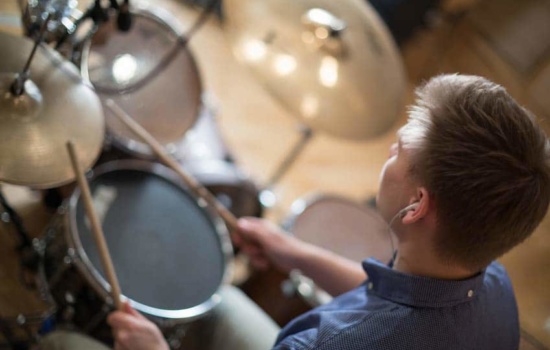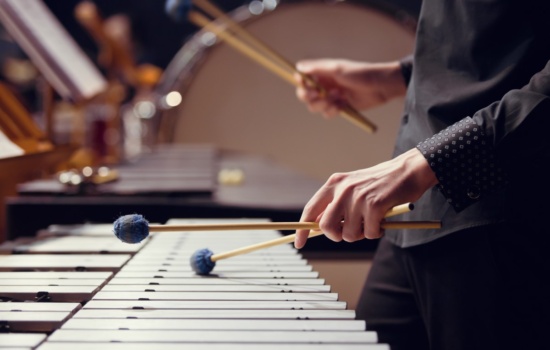Music Career Finder
Survey Start
How to Become an Accompanist
Career Overview
An Accompanist (or Collaborative Pianist) is a Pianist who accompanies Singers, Dancers, and Instrumentalists for performances and rehearsals.
Alternate Titles
Collaborative Pianist, Accompanyist
Avg. Salary
$40 per hour ($83,200 per year)1
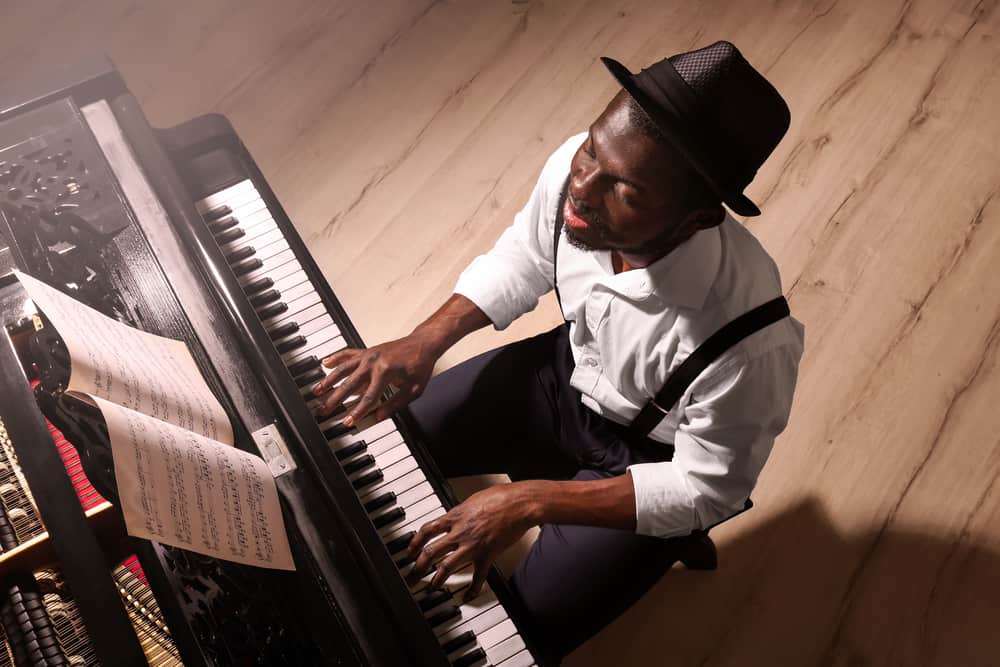
How To Become an Accompanist
- Accompanists play music for and with other musicians and singers during live performances, recitals, and recordings
- Accompanists who play piano (which is most common) prefer to be called collaborative pianists
- An accompanist typically works evenings and weekends when performances happen
- Performing accompanists can also be session musicians and private music teachers
- The average income for an independent piano accompanist is $40 per hour ($83,200 per year) but can range from $30-56 per hour ($62,400 to $116,480 per year)
- Career Description
- Salary
- Career Outlook
- Career Path
- Experience & Skills
- Education & Training
- Additional Resources
- Sources
- References
Career Description
Accompanists, AKA collaborative pianists, play music for and with singers and instrumentalists in lessons, rehearsals, recitals, concerts, and on recordings.
What Does an Accompanist Do?
Most Accompanists play the piano, but there are also accompanists who play other instruments, like guitar or harp.
Acclaimed pianist Dr. Ray Wong (The Juilliard School, Manhattan School of Music, Harvard University) said “pianists are the most in-demand due to the vast possibilities of the piano.”
In modern contemporary popular styles, including jazz, accompanists might be musicians playing other instruments like drums and bass in a rhythm section or as a backup band for a singer.
Accompanists who play the piano generally prefer to be called a “Collaborative Pianist” or “Collaborative Keyboardist,” since they will often perform as part of a group, like an orchestra or a chamber ensemble.
Expert pianist Dr. Mark Livshits (Franklin and Marshall College, University of Delaware) said the main responsibility of an Accompanist is to make the main performer shine.
“…It is our job to frame the person we’re accompanying,” he told us.
“If it’s chamber music, it’s to create the best texture and to let the musicians that we’re accompanying play with whatever kind of sound, texture, and dynamic they want, giving them as much leeway, within reason, to do whatever they need.”
A Day In the Life of an Accompanist
Dr. Alex Maynegre-Torra (Staff Accompanist, University of Texas – Austin Butler School of Music) said most of your regular work will happen on the weekends when performances typically happen.
“If you want an 8 to 5 job, this won’t do,” he said.
“Working in an academic setting, when you approach mid-semester you know that you will play many recitals after 5:00 p.m. accompanists [even freelancers] are performers, and most performances occur during weekday evenings or weekends.”
Dr. Livshits said his days as a performer would often go from 9 a.m. to 9:30 p.m., rehearsing, traveling to different cities, and performing.
Salary
The average income for an independent piano accompanist is $40 per hour, which equates to $83,200 per year (40 hours a week for 52 weeks).
But the wages can range from $30-56 per hour ($62,400 to $116,480 per year)1.
This all depends on your location, skill level, and reputation.
How Does an Accompanist Make Money?
Accompanists are usually freelancers, so they can negotiate their own rates.
And even though the hourly is very good, accompanists are not working 8 hours a day.
Some of a piano accompanist’s paying clients could include:
- Performing vocalists
- Local bands and artists in need of supporting musicians
- Choral groups
- Theater productions
- Dance companies that specialize in ballet
- Educational institutions (working at recitals)
- Festivals and competitions (playing for participants)
- Recording artists (i.e. being a session musician)
- Piano student
Hey, what do you think about trying our new Music Career HelperMusic Career Helper really quick? It’s totally free and could help get your career moving fast! Give it a try. It’s totally free and you have nothing to lose.
Career Outlook
As long as there are live performances, theater productions, and recording artists, accompanists will be in demand.
You will have to be okay not being the center of attention. Your job is to make the main performer(s) shine, supporting them through your playing.
This is a freelance career, so you’ll have to treat it with an entrepreneurial mindset. You have to go out and find the work, then do it well enough that you keep it.
Also, you will be working many evenings and weekends when performances usually happen.
Many accompanists also teach private instrument lessons, which typically happen in the afternoon after people are done with school and work.
Career Path
To become a collaborative pianist, you need to meet people and play with other musicians, according to teacher and pianist Warren Jones (Manhattan School of Music Collaborative Piano Faculty).
“Start making music with other people, and see if it suits you,” he said.
“Some people do not easily work with others–that’s fine, no problem. But to develop a career as a Collaborative Pianist, you really need to enjoy and like making music together with other people!”
Performing Accompanist
This is the most common career path for an accompanist. This is where you would work with singers, local performing bands and artists, choirs, theater productions, ballet companies, and any type of performer who needs live music.
Dr. Livshits said to say yes to jobs, even if you think they’re too small. “Small” jobs give you experience, and you also never know who’s listening.
“People hear you in the most unexpected ways,” he said.
“I got my start just because I was the only person in my quintet in college who came prepared for the lesson. The coach was a member of the Philadelphia Orchestra, and he passed along my name to the conductor, and that’s how I got my start with him.”
Session Musician
One way you can “accompany” a song with your musical skills is in the recording studio. You have the skills to be a session musician, which is someone who gets hired to record their instrument on someone’s song or soundtrack.
You can find these gigs by connecting with recording artists, music producers, and audio engineers.
Private Music Teacher
Because you’re an expert at your instrument, you can try your hand at teaching private music lessons. If you’re patient and love helping others find joy in playing an instrument, you could be a good teacher.
Professor of Music
If you want to teach others how to become accompanists and pianists, you can earn a master’s and/or doctorate in music. From there, you can look for professor positions at universities.
Experience & Skills
Here are the skills you’ll need to succeed as an accompanist…
Know Music Theory
Having a firm grasp of music theory will help you easily follow along with other musicians, both during rehearsals and while performing on stage.
Read Sheet Music
Since Accompanists must frequently read from sheet music, written arrangements, and lead sheets, they must be strong readers of music. This includes sight-reading, which is a specific and separate skill from reading (though related), where an accompanist must read from music they haven’t seen previously.
Dr. Wong said sight reading is the most important skill you need.
“Sight-reading is among the most important skills for accompanists, and a great sight-reader will always be in demand!” he said.
Be Able To Follow the Band Leader
Accompanists must be able to follow a conductor or the band leader while still reading the sheet music. Performing with others requires attention to musical “cues,” or signals, to keep together through any tempo or dynamic changes, stopping and starting, key changes, or other changes in the music.
Piano teacher and expert pianist Rita Sloan (University of Maryland, Director of Collaborative Piano Program) said listening in the moment is crucial.
“Really listen to them while you are busy playing,” she said.
“That’s at the heart of it: to be able to hear yourself and your partner in real-time at the same time. The bottom line is how you play with other people, how you collaborate with them. That’s why it’s called collaborative piano.”
Organization
Collaborative pianists and other accompanists who work independently as freelancers, whether full- or part-time, must also develop strong administrative skills. This includes managing a hectic schedule, accounting for travel time, organizing a system for sheet music storage and retrieval, billing clients, and myriad other small, but crucial tasks required for being in business as a sole proprietor.
Be Easy To Work With
Interpersonal skills, sometimes called “soft skills,” are especially important for the successful accompanist. Getting right to the point: No one likes to work with a jerk, so don’t be one. Soloists and performers are already under a lot of pressure to always be at their best, so having an easygoing demeanor and approach will help them feel more comfortable.
Jones emphasizes the importance of being a good listener.
“Probably the most important skill and ability that a person can develop to be a collaborative pianist is to listen, listen, listen to one’s colleagues because that is the basis for really collaborating musically with someone else,” he said.
Consider Learning More Than One Instrument
The more instruments you’re proficient at, the more valuable and in-demand you will be.
Dr. Wong encourages aspiring collaborative pianists to have a diverse set of skills, not just piano.
“…I encourage people to do as many diverse musical activities as possible, since each thing that you do, each skill that you develop, helps all your other skills to be better!” he said.
Education & Training
First and foremost, a collaborative pianist must be an accomplished musician. They must be comfortable quickly learning new music in a plethora of musical styles, covering a wide range of repertoire.
How do you get to that point?
You can either go to school for music or learn on your own.
Accompanist Degree
There are very few programs for undergraduate degrees in collaborative piano, although some do exist. Most collaborative piano programs are at the graduate level, typically a Master of Music (M.M.) or a Doctor of Musical Arts (D.M.A.).
So as an undergraduate student, you should study music with a focus on performance.
Sloan said that, if you do get a degree in collaborative piano, it should be a graduate-level degree “during undergrad, a Pianist really needs to become the best Pianist they can possibly be.”
Self-Taught Accompanist
You can learn how to play piano, how to read sheet music, and how to play with others on your own and through real-world experience. It may take you longer to get to an advanced level, but it’s still possible.
Regardless of how you choose to educate yourself, the learning never stops, according to Dr. Livshits.
“Getting a college education in music is invaluable simply because your growth doesn’t stop once you graduate high school,” he said.
“I still take lessons even though I finished my DMA four years ago, almost. Once in a while, I still see a teacher just for kind of a tune-up. You have the upkeep.”
Additional Resources
There are no professional associations specifically for accompanists, although professional pianists can benefit from the performance and networking opportunities found via the American Pianists Association.
For online resources, Dr. Maynegre-Torra said the most comprehensive website she knows about for collaborative piano is The Collaborative Piano Blog. It has many interesting articles about the profession and useful insight about practicing habits.”
Sources
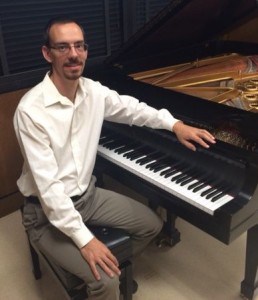
Dr. Alex Maynegre-Torra
Dr. Alex Maynegre-Torra is a Staff Accompanist at the prestigious University of Texas – Austin Butler School of Music. He has also accompanied performers at Texas State, Blue Ridge Community College, and more.
When he was seven, he began studying the piano in his hometown of Mataró, Spain; he later went on to receive a degree in piano performance from the Conservatori Superior del Liceu de Barcelona, a Master of Music degree and Artist Diploma in Piano Performance at the Hartt School, and a Doctor of Music Arts in Collaborative Piano at the University of Colorado – Boulder. He has served as a sheet music editor for works published by Ovation Press.
He is a member of the Austin Symphony Orchestra. A selection of his musical works can be heard via Spotify.

Warren Jones
Warren Jones enjoys a notably eclectic career that has taken him to virtually every corner of the musical world. He performs with some of today’s best-known artists such as Stephanie Blythe and Anthony Dean Griffey, and he is the Principal Pianist for the exciting California-based chamber music ensemble, Camerata Pacifica.
In the past he has partnered such great performers as Marilyn Horne, Håkan Hagegård, Kathleen Battle, Samuel Ramey, Christine Brewer, Barbara Bonney, Carol Vaness, Judith Blegen, Salvatore Licitra, Tatiana Troyanos, Thomas Hampson, James Morris, and Martti Talvela; and he has appeared in concerts with both the Juilliard Quartet and the Borremeo Quartet.
Mr. Jones is a longtime faculty member at the Manhattan School of Music and a former faculty member at the Music Academy of the West, and recently finished an appointment as Artist in Residence in Music at the Mason Gross School of the Arts at Rutgers University. In 2017, Mr. Jones was invited by the National Association of Teachers of Singing to be the inaugural Master Teacher in their Intern Program for young Collaborative Pianists at the Faculty of Music at the University of Toronto; and later in that year, he served as Artist in Residence in Opera at New England Conservatory and at the University of North Carolina School of the Arts.
Mr. Jones has received the “Achievement Award” from the Music Teachers National Association of America, their highest honor; and has been selected as “Collaborative Pianist of the Year” by the publication Musical America. In the summer of 2018, he inaugurated an innovative Vocal Workshop program at the Manchester Music Festival in Vermont for young Singers and Pianists, and he will return there following this engagement in Toronto; and his schedule in 2019 also included a residency at the University of Colorado at Boulder where he will teach and perform alongside members of the Takacs Quartet.
As an invited guest at the White House, Mr. Jones has performed for state dinners in honor of the leaders of Canada, Russia, and Italy; and three times he has been the guest of the Justices of the United States Supreme Court for musical afternoons in the East Conference Room at the Court. As a musical jurist, he has participated in judging the Van Cliburn International Piano Competition, the Montreal International Vocal Competition, the Metropolitan Opera National Auditions, and the Naumberg Awards. He joined the jury of the prestigious First China International Piano Competition in Beijing in May 2019.
A graduate of both New England Conservatory and San Francisco Conservatory of Music, Mr. Jones was honored with the Doctor of Music degree from SFCM, and recently was selected as a faculty member of the Board of Trustees at MSM.
His discography contains thirty-one recordings on every major label in a wide range of classical, romantic, and contemporary repertory. His conducting appearances are similarly varied: he has led sold-out critically-acclaimed performances of Mascagni’s L’amico Fritz, Rossini’s Il barbiere di Siviglia, Donizetti’s Don Pasquale, Mozart’s Die Zauberfloete, and Trouble in Tahiti of Bernstein. In 2014, he conducted the world premiere of a new operatic version of A Christmas Carol at the Houston Grand Opera.
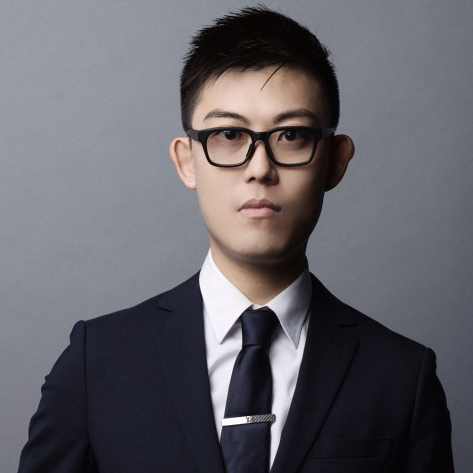
Dr. Ray Wong
Dr. Raymond (Ray) Wong is a Pianist based in Manhattan, New York. He has been featured in International Pianists Magazine, The New York Times, The LA Times, The New Yorker Magazine, The Boston Globe, The Philly Inquirer, The Herald Tribune, Allegro Magazine, WQXR New York Classical Radio, NPR National Public Radio, The National Classical Music Radio of the Czech Republic, The Georgia Straight, CBC Canadian National Radio and Television, among others.
Recent performances include fashion designer Josie Natori’s FW20 Runway for New York Fashion Week, Musical Explorers at Zankel Hall, Carnegie Hall, solo, chamber, and collaborative performances in Alice Tully Hall at Lincoln Center, The Kimmel Center, and The Academy of Music in Philadelphia, Carnegie Hall’s Weill Hall, Zankel Hall, and Isaac Stern Auditorium, The Van Cliburn Recital Hall in Bass Performance Hall, and performances with The Juilliard Orchestra under the batons of Maestro Leonard Slatkin, Alan Gilbert, Jeffrey Milarsky, and Marin Alsop.
He has had the privilege of working with many of his music idols such as Itzhak Perlman, Glenn Dicterow, Robert McDonald, The Juilliard String Quartet, and has played in masterclasses with numerous pedagogues including Jeremy Denk, Ivan Moravec, Christoph Eschenbach, Ann Schein, Yoheved Kaplinsky, Leslie Howard, Philippe Entremont, John Perry, among others.
As a soloist, Mr. Wong has been a laureate of The New York Concert Artists International Concerto Competition, New York Sinfionetta International Concerto Competition, The Bradshaw & Buono International Competition, Bechstein Piano Competition, the Mieczyslaw Munz Chopin Piano Competition, Festival of the Arts Canadian Music Competition, The Prague International Piano Festival Competition, Artists International Auditions, and The Seattle International Piano Competition.
Dr. Wong has adjudicated on the jury of The Seattle International Piano Competition, The Pacific International Youth Society, and the Music Educators Association of New Jersey Piano Competitions. He is recipient of Steinway & Sons’ Outstanding Teacher Award, and has been a guest lecturer at The University of Southern California (USC), an official Collaborative Pianist of The Walter W Naumburg International Competition, and is currently the rehearsal pianist for The Orchestra of St. Luke’s, and pianist for Musical Explorers, and The Orchestra Moves, as a part of Carnegie Hall’s Education Program, Link Up!
Raymond was an original member of The First National Tour of the Tony Award-winning Broadway musical, An American in Paris as a featured Pianist performing the piano concertos of George Gershwin. Venues include Walt Disney Hall in Orlando, The Fox Theatre in Saint Louis, The Academy of Music in Philadelphia, The Kennedy Center in Washington, Segerstrom Center for the Arts, and The Pantages Theaters in Los Angeles, among others.
The current season includes The Lyric & Lyricists Series at The 92Y, Carnegie Hall Family Concert Series, Peter and the Wolf with John Lithgow, and the Carnegie Hall Gala performance of Candide under the baton of Rob Fisher. He has had the honor of performing solo recitals for Queen Sofia of Spain, Placido Domingo, former Canadian Prime Minister Jean Chrétien, and the late President George HW Bush, and the late First Lady, Barbara Bush.
Dr. Wong received his degrees in Solo Piano Performance and Collaborative Piano from The Manhattan School of Music and The Juilliard School in New York, and an Education degree from Harvard University. Raymond’s Doctoral dissertation, “The Celestial Circus” is based on a work composed for him and Pianist Xiayin Wang by Composer Richard Danielpour. Its world premiere was given by Wang/Wong at Lincoln Center in March of 2014.
Dr. Wong is CEO of Steven Ray Artists.
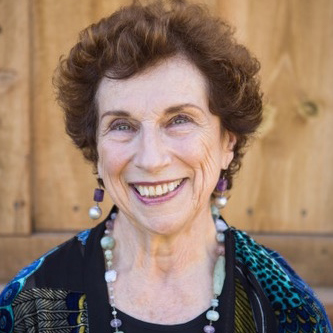
Rita Sloan
Rita Sloan is acknowledged internationally as a leading Teacher of piano, collaborative piano, and chamber music.
In 1999, she was appointed a Piano Faculty Member and Director of the Collaborative Piano Program at the University of Maryland. As an Artist Faculty Member at the Aspen Music Festival, Ms. Sloan founded their Collaborative Piano Program.
She has performed as soloist with both the Aspen Festival Orchestra and Chamber Symphony as well as in chamber music with many of Aspen’s distinguished guest artists, including Pianists Wu Han and Orli Shaham, Violinists Sarah Chang and Nadia Salerno-Sonnenberg, Cellist Gary Hoffman, Bassist Edgar Meyer and Flutist Emmanuel Pahud.
Teaching residencies and master class presentations have included Tainan National University of the Arts and National Normal University in Taiwan, China Conservatory in Beijing, China, leading universities in Seoul, Korea, London’s Royal College of Music, and American universities and conservatories, including numerous visits to the Juilliard School in New York.
Ms. Sloan has performed with orchestra, in recital, and in chamber music throughout the U.S., Europe, South America, and Japan. She has been a guest in many chamber music venues and has performed with members of the Emerson and Guarneri String Quartets.
Born in Russia to Polish parents, Ms. Sloan graduated from the Juilliard School, where she studied with Martin Canin and Rosina Lhévinne. Further studies were with Leon Fleisher, Aube Tzerko, Herbert Stessin, and Vladimir Ashkenazy.
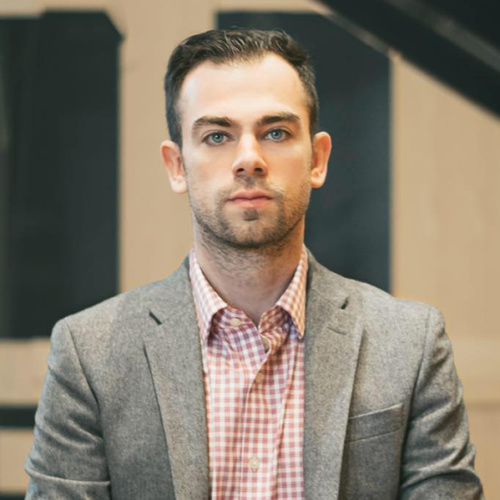
Dr. Mark Livshits
GRAMMY-nominated Pianist Mark Livshits is one of the most highly sought-after soloists and chamber musicians in Philadelphia. He appears frequently in concert with members of the Philadelphia Orchestra as well as with the orchestra as a substitute in the keyboard section.
In addition to performances at the Salzburg Festival, solo recitals at the Shanghai Oriental Arts Center, and Bilbao Philharmonic Society, Dr. Livshits has also worked closely with musicians such as Yannick Nezet Seguin, Stephane Denève, Michael Tilson Thomas, Nikolaj Znaider, Leonidas Kovakos, Lynn Harrell, Christoph Eschenbach, Alisa Weilerstein, Measha Brueggergosman, Dave Brubeck, and Deutsche Grammophon recording artist Ye-Eun Choi under the auspices of IMG Artists and the Anne-Sophie Mutter Foundation.
Dr. Livshits has also received invitations to perform for dignitaries such as Secretary of State Colin Powell and Vice President Joe Biden. Currently, he serves as Staff Accompanist at the McDuffie Center for Strings in Macon, Georgia as well as being on faculty at the Philadelphia International Music Festival. In addition, Dr. Livshits was recently named to the faculty of Franklin and Marshall College.
References
- 1. "Total salary range for Independent Piano Accompanist Hourly Pay". Glassdoor . published: Jul 6, 2024. retrieved on: Oct 31, 2024

